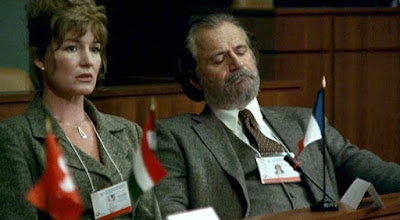 Battle in Seattle (Stuart Townsend, 2007) I admit I have a bit of a chip on my shoulder regarding this movie. Written and directed by actor Stuart Townsend, the film was yet another Seattle movie that was photographed, for the most part, in Canada, specifically "Seattle" North, Vancouver British Columbia. It was post-produced in Montreal, Canada, and for authenticity, they cast a few American actors, shot a day or two in Seattle (actually!) and spent the rest of the time writing and shooting around the story. Give it credit, there is a lot of Seattle in it, but mostly from the archive footage of many news sources and folks present on the scene. In Townsend's version, Seattle looks a lot more "Caucasian" than it is, and feels entirely phony. But then, this isn't even trying to be a true telling of events, other than its advocacy. It's a disaster movie, with all the tarted up (they use that phrase in Vancouver) melodrama of an Irwin Allen picture. There's even that standard of the D-movie: "Pregnant Woman in Peril," played by the director's then-squeeze, Charlize Theron.
Battle in Seattle (Stuart Townsend, 2007) I admit I have a bit of a chip on my shoulder regarding this movie. Written and directed by actor Stuart Townsend, the film was yet another Seattle movie that was photographed, for the most part, in Canada, specifically "Seattle" North, Vancouver British Columbia. It was post-produced in Montreal, Canada, and for authenticity, they cast a few American actors, shot a day or two in Seattle (actually!) and spent the rest of the time writing and shooting around the story. Give it credit, there is a lot of Seattle in it, but mostly from the archive footage of many news sources and folks present on the scene. In Townsend's version, Seattle looks a lot more "Caucasian" than it is, and feels entirely phony. But then, this isn't even trying to be a true telling of events, other than its advocacy. It's a disaster movie, with all the tarted up (they use that phrase in Vancouver) melodrama of an Irwin Allen picture. There's even that standard of the D-movie: "Pregnant Woman in Peril," played by the director's then-squeeze, Charlize Theron.In his commentary, Townsend acknowledges he didn't know much about what went down in 1999 at the Seattle-housed WTO conference, but, like everyone else, he was grabbed by the headlines and that phrase "Battle in Seattle." Research into the WTO and the complications from its basic philosophy of "you can't have a war with someone you're economically tied with (but you can sure as hell exploit them)" led to him finding a reason to make the movie in the second place. But, ultimately, although the message is there in the graphics-laden sections, the story still boils down to police versus demonstrators and bricks versus windows. The message, like with the riots, can't be seen for all the tear-gas.
And Townsend tries to represent all sides—the demonstrators', the delegates', the mayor's, the governor's, the reporters', the merchants,' as well as that of the police—to the point where the only folks to blame are those darned anarchists (much like the surface spin of the event) for not towing the line of having an orderly demonstration, albeit one with as many different agendas as there were countries in attendance. Lip-service is given to the fact that things didn't get dicey until Madeleine Albright called to gripe to her boss, President Clinton, that she couldn't get out of her hotel room, thus throwing the fellow local Democratic administrations to get their own brown-shirts in a twist and over-react.
Townsend even shoots himself in the foot by showing delegates of the WTO with legitimate concerns having them over-shadowed and ignored by...those darned uppity protesters. By showing all sides, ultimately Townsend doesn't take sides and the movie becomes merely about the relationships of the demonstrators and the hurdles the National Guard presence threw up for all concerned. A political riot should be about more than delaying True Love, which, according to Battle in Seattle, it does, until the movie ends in an extended group-hug.
A making-of documentary has a clutch of representatives from a few of the protest groups pay lip-service to the film, and they're all cheery about it, despite the fact that everybody got their own black eyes from the occurrence. But, then, if you want to get your message out there, there isn't such a thing as "bad" publicity; it's what happens when idealists become egotists and politics becomes show business (or is it the other way around?).
The performances are fine, although Ray Liotta is far too young to be playing someone elected mayor of Seattle—and the guy they've got playing Gary Locke sounds like the first one they found from Central Casting who fit the description "Chinese." Among the protesters, Jennifer Carpenter is merely okay as a lawyer representative for the protesters—she rocks on "Dexter"—there is a token African-American (André Benjamin from Outkast), a token Latina (Michelle Rodriguez), and a token New Zealander (Martin Henderson) and that's about it. Attempts at cast diversity are merely skin-deep. Although two of the delegates are played by Rade Serbedzija and Isaach De Bankolé, their roles are small and, like Woody Harrelson, they spend most of their time looking frustrated.
If so, I'm walking in solidarity, brothers.






No comments:
Post a Comment